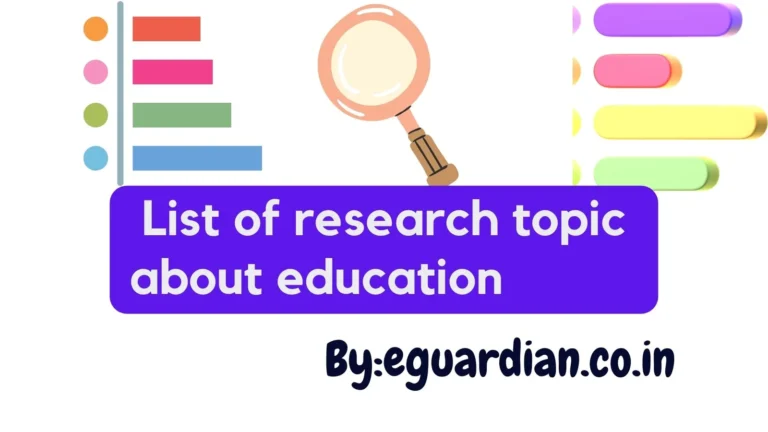Top Research Topics in Education | List of Latest Educational Research Ideas.

Education is a dynamic and evolving field that reflects the changing needs of society, learners, and technology.
Whether you’re a teacher trainee, postgraduate student, or a doctoral scholar, selecting a relevant and impactful research topic is crucial.
This curated list offers fresh and trending research topics in education to inspire your academic work, from online learning and inclusive education to curriculum design and teacher effectiveness.
Top Research Topics in Education
1. Embracing Technology in the Classroom
With the rapid advancement of technology, exploring its integration into the classroom has become paramount.
Research topics in this area could include assessing the effectiveness of edtech tools, exploring innovative teaching methods such as gamification and virtual reality, and investigating how technology can bridge the digital divide among students.
2. Equity and Inclusivity
Promoting equity and inclusivity in education remains a pressing issue. Research topics may encompass strategies for addressing disparities in access to quality education, examining the impact of culturally responsive teaching practices, and exploring ways to create inclusive learning environments for students from diverse backgrounds.
3. Remote and Online Learning
The COVID-19 pandemic has accelerated the adoption of remote and online learning models. Research in this area could focus on evaluating the effectiveness of virtual classrooms, exploring best practices for online instruction, and investigating the long-term impact of remote learning on student engagement and outcomes.
4. Social and Emotional Learning (SEL)
Recognizing the importance of social and emotional learning in academic success and overall well-being, research topics may include assessing the effectiveness of SEL programs, exploring the role of SEL in mitigating the effects of trauma and stress on students, and examining the impact of SEL on school climate and culture.
5. Assessment and Accountability
Traditional, standardized testing has come under scrutiny in recent years. Research topics could explore alternative assessment methods, such as performance-based assessments and portfolios, examine the validity and reliability of non-traditional assessment tools, and investigate the role of assessment in promoting deeper learning and critical thinking skills.
6. Policy and Reform
Educational policy plays a significant role in shaping the direction of education. Research topics may encompass analyzing the impact of policy reforms on student achievement and school performance, examining the efficacy of funding mechanisms in promoting educational equity, and exploring innovative policy solutions to address current challenges in education.
साक्षात्कार के प्रश्न उत्तर और पर्सनल इंटरव्यू की तैयारी कैसे करें
Conclusion
As we look ahead, it’s clear that the field of education is ripe for exploration and innovation. By focusing on these research topics, educators, policymakers, and researchers can contribute to the advancement of knowledge and the improvement of educational outcomes for all students.
Whether it’s harnessing the power of technology, promoting equity and inclusivity, or reimagining assessment and accountability, there are countless opportunities to make a meaningful impact in education. As we embark on this journey of discovery, let us remain committed to fostering a brighter future for learners around the globe.
Let’s embrace the challenges and opportunities that lie ahead as we strive to create a more equitable, inclusive, and effective education system for generations to come.
